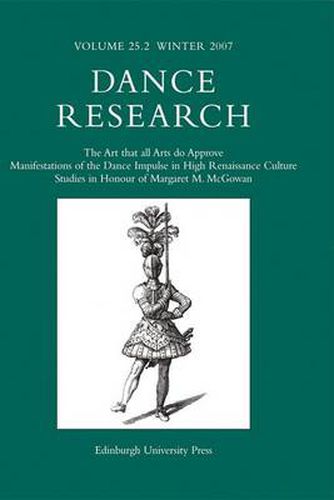Readings Newsletter
Become a Readings Member to make your shopping experience even easier.
Sign in or sign up for free!
You’re not far away from qualifying for FREE standard shipping within Australia
You’ve qualified for FREE standard shipping within Australia
The cart is loading…






Margaret McGowan is the doyenne of British dance historians; in celebration of her long and distinguished career and to coincide with its Silver Anniversary, the scholarly journal Dance Research has invited a number of distinguished dance historians and colleagues working in arts cognate with dance to contribute essays in her honour. The connecting theme is dance as an over-arching and stimulating agent, contributing to cultural and intellectual life during the early modern period in ways that were broader and more profound in their influence than is often recognised. These essays reveal an art that in the early stages of its development invariably resonated with ‘context’, and was widely exploited for social and political purposes. Contributions explore the nature of dance forms and, in explaining their evolution, highlight the discovery of significant links between rhetoric, discourses on art and architecture, and the language used by dancing masters.In paying tribute to a major pioneer in the discipline of dance studies, this study presents a compelling argument for the universality of dance, for its character as central to human experience, and for its power to stimulate endeavour across an unexpectedly broad front of experience and expression.
$9.00 standard shipping within Australia
FREE standard shipping within Australia for orders over $100.00
Express & International shipping calculated at checkout
Margaret McGowan is the doyenne of British dance historians; in celebration of her long and distinguished career and to coincide with its Silver Anniversary, the scholarly journal Dance Research has invited a number of distinguished dance historians and colleagues working in arts cognate with dance to contribute essays in her honour. The connecting theme is dance as an over-arching and stimulating agent, contributing to cultural and intellectual life during the early modern period in ways that were broader and more profound in their influence than is often recognised. These essays reveal an art that in the early stages of its development invariably resonated with ‘context’, and was widely exploited for social and political purposes. Contributions explore the nature of dance forms and, in explaining their evolution, highlight the discovery of significant links between rhetoric, discourses on art and architecture, and the language used by dancing masters.In paying tribute to a major pioneer in the discipline of dance studies, this study presents a compelling argument for the universality of dance, for its character as central to human experience, and for its power to stimulate endeavour across an unexpectedly broad front of experience and expression.